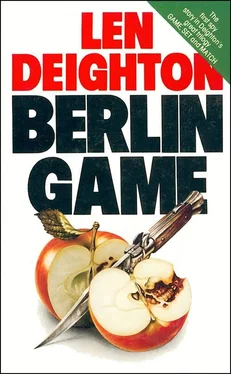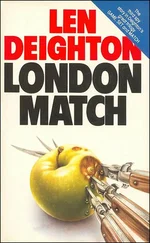Len Deighton - Berlin Game
Здесь есть возможность читать онлайн «Len Deighton - Berlin Game» — ознакомительный отрывок электронной книги совершенно бесплатно, а после прочтения отрывка купить полную версию. В некоторых случаях можно слушать аудио, скачать через торрент в формате fb2 и присутствует краткое содержание. Жанр: Триллер, на английском языке. Описание произведения, (предисловие) а так же отзывы посетителей доступны на портале библиотеки ЛибКат.
- Название:Berlin Game
- Автор:
- Жанр:
- Год:неизвестен
- ISBN:нет данных
- Рейтинг книги:4 / 5. Голосов: 1
-
Избранное:Добавить в избранное
- Отзывы:
-
Ваша оценка:
- 80
- 1
- 2
- 3
- 4
- 5
Berlin Game: краткое содержание, описание и аннотация
Предлагаем к чтению аннотацию, описание, краткое содержание или предисловие (зависит от того, что написал сам автор книги «Berlin Game»). Если вы не нашли необходимую информацию о книге — напишите в комментариях, мы постараемся отыскать её.
Berlin Game — читать онлайн ознакомительный отрывок
Ниже представлен текст книги, разбитый по страницам. Система сохранения места последней прочитанной страницы, позволяет с удобством читать онлайн бесплатно книгу «Berlin Game», без необходимости каждый раз заново искать на чём Вы остановились. Поставьте закладку, и сможете в любой момент перейти на страницу, на которой закончили чтение.
Интервал:
Закладка:
I ran, too, choosing a path that would converge on the policemen's. I ran alongside them through the springy undergrowth of the dark forest. Lenin looked round to see who was chasing him, saw me, and looked to his front again. 'This way!' I shouted, and headed down a path that led back to the lakeside.
For a moment Lenin and his three subordinates continued going the way that Munte had gone. Surely the old man had heard them coming after him by now. 'You four!' I shouted with the sort of arrogance that was calculated to convince them of my seniority. 'This way, you bloody fools. He's heading for the boat!'
Still the men raced after Lenin, while I continued on the path. This was my last chance. 'Do you hear me, you idiots?' I shouted breathlessly. 'This way, I say!'
My desperation must have been the convincing factor, for Lenin changed direction and came thumping across the forest floor, his ammunition boots shaking the earth, his eyeballs dilated and his face bright red with exertion. 'The boat is hidden,' I shouted to account for what I guessed would be the complete absence of any boat when they reached the water. I waved the uniformed cops past me and then went back up the path as if expecting more policemen who might need guidance.
But by the time I was fifty yards up the track, Lenin had got to the waterfront and found no boats or places along the lake's edge where any could be hidden. He'd sent the young Saxon conscript back to find me.
'Stop, sir,' said the cop in that unmistakable accent.
'This way!' I shouted, bluffing to the end.
'Stop, sir,' said the cop again. 'Stop or I shoot.' He had his pistol in his hand. I reasoned that a conscript lad who argued with the leader of his arrest team might well be the type who would pull the trigger. I stopped. 'Your identification, please, sir,' said the cop.
I could see Lenin plodding back up the path, breathing heavily and wriggling his fingers in anger. The game was up. 'I was just trying to help,' I said. 'I saw him come this way.'
'Search him,' said Lenin to the Saxon boy. He paused to catch his breath. Then take him back and lock him up.' To the other cop he said, 'We'll go to the Müggelheimer Damm, but we've probably lost them. They must have had a car waiting there.' He came very close to me and stared me in the eyes. 'We'll find out all about it from this one.'
28
They locked me in an office of the police barracks. It had a barred window and a mortice lock; they figured I wasn't dangerous enough to need a prison cell. In a perverse way I resented that. And I resented the fact that Lenin sent the Saxon kid in to do the first interrogation. 'What's your name and who employs you?' – all that sort of crap. And always that accent. I kept trying to guess the exact location of his hometown, but it was a game he wouldn't join. I think he was from some little town in the German backwoods where Poland meets Czechoslovakia. But I got him off guard by talking about his accent and his family. And when I suddenly switched the topic of conversation to the fiasco at Müggelsee, he let slip that the Muntes had got away. I nodded and asked him for something to eat so quickly afterwards that I don't think he even noticed what he'd said.
After the Saxon kid had finished, they left a blank-faced young cop sitting in the office with me, but he wouldn't respond to my conversation. He didn't say anything, or even watch me, when I went to look out the window. We were on the top floor of what the international intelligence community calls 'Normannenstrasse', East Germany 's State Security Service block in Berlin-Lichtenberg.
From this side of the building I could look down on Frankfurterallee. This wide road is Berlin 's main highway eastwards and there was a steady stream of heavy traffic. The weather had turned colder now, and the only people on the street were clerical staff from the State Security Ministry filing down the steps into Magdalenenstrasse U-Bahn station at the end of the working day.
Lenin joined in the fun about midnight. They'd taken my wrist-watch, of course, along with my money, a packet of French cigarettes, and my Swiss Army knife, but I could hear a church or a municipal clock striking each hour. Lenin was amiable. He even laughed at a joke I made about the coffee. He was older than I had estimated: my age perhaps. No wonder that chase through the forest had made him puff. He wore a brown corduroy suit with button-down top pocket and braided edges to the lapels. I wonder if he'd designed it himself or had picked it up from some old village tailor in a remote part of Hungary or Rumania. He liked travelling; he told me that. Then he talked about old American films, the time he'd spent seconded to the security police in Cuba, and his love for English detective stories.
He brought out his tiny cheroots and offered me one; I declined. It was the standard interrogator's ploy.
'I can't smoke them,' I told him. 'They give me a sore throat.'
'Then I suggest that we both smoke the French cigarettes we took from you. Permit?'
I was in no position to object. 'Okay,' I said. He produced my half-empty packet of Gauloises from his coat and took one before sliding one across to me.
'I found those Western cigarettes on the U-Bahn train,' I said.
He smiled. 'That's what I wrote in the arrest report. You think I don't listen to what you say?' He threw his cigarette lighter to me. It was of Western origin, an expendable one with visible fuel supply. It was very low but it worked. 'Now we destroy the evidence by burning, you and me. Right?' He winked conspiratorially.
Lenin, who said his real name was Erich Stinnes, had an encyclopedic memory; he was able to recite endlessly the names of his favourite authors – for they were many and varied – and he seemed to know in bewildering detail every plot they'd written. But he spoke of the fictional characters as if they were alive. 'Do you think,' he asked me, 'that Sherlock Holmes, coming across a criminal of some foreign culture, would find detection more difficult? Is it perhaps true that he is effective only when working against a criminal who shares the creed of the English gentleman?'
'They're just stories,' I said. 'No one takes them seriously.'
'I take them seriously,' said Lenin. 'Holmes is my mentor.'
'Holmes doesn't exist. Holmes never did exist. It's just twaddle.'
'How can you be such a philistine,' said Lenin. 'In The Sign of Four , Holmes said that when you have eliminated the impossible, whatever remains, no matter how improbable, must be the truth. Such perception cannot be dismissed lightly.'
'But in A Study in Scarlet he said almost the opposite,' I argued. 'He said that when a fact appears opposed to a long train of deductions, it invariably proves to be capable of bearing some other interpretation.'
'Ah, so you are a believer,' said Lenin. He puffed on the Gauloise. 'Anyway, I don't call that a contradiction.'
'Look, Erich,' I said. 'All I know about Sherlock bloody Holmes is the curious incident of the dog in the night-time.'
Lenin waved a hand to silence me, sat back with hands placed fingertips together, and said, 'Yes, "Silver Blaze".' A frown came as he tried to remember the exact words: 'The dog did nothing in the night-tune. That was the curious incident.'
'Exactly, Erich, old pal,' I said. 'And, as one Sherlock Holmes fan to another, would you mind explaining to me the equally curious absence of any proper bloody attempt to interrogate me.'
Lenin smiled a tight-lipped little smile, like a parson hearing a risqué joke from a bishop. 'And that's just what I would say in your position, Englishman. I told my superior that a senior security man from London will wonder why we are not following the normal procedure. He will begin to hope that he'll get special treatment, I said. He'll think we don't want him to know our interrogation procedure. And he'll think that's because he's going home very soon. And once a prisoner starts thinking along those lines, he closes his mouth very tight. After that it can take weeks to get anything out of him.'
Читать дальшеИнтервал:
Закладка:
Похожие книги на «Berlin Game»
Представляем Вашему вниманию похожие книги на «Berlin Game» списком для выбора. Мы отобрали схожую по названию и смыслу литературу в надежде предоставить читателям больше вариантов отыскать новые, интересные, ещё непрочитанные произведения.
Обсуждение, отзывы о книге «Berlin Game» и просто собственные мнения читателей. Оставьте ваши комментарии, напишите, что Вы думаете о произведении, его смысле или главных героях. Укажите что конкретно понравилось, а что нет, и почему Вы так считаете.












